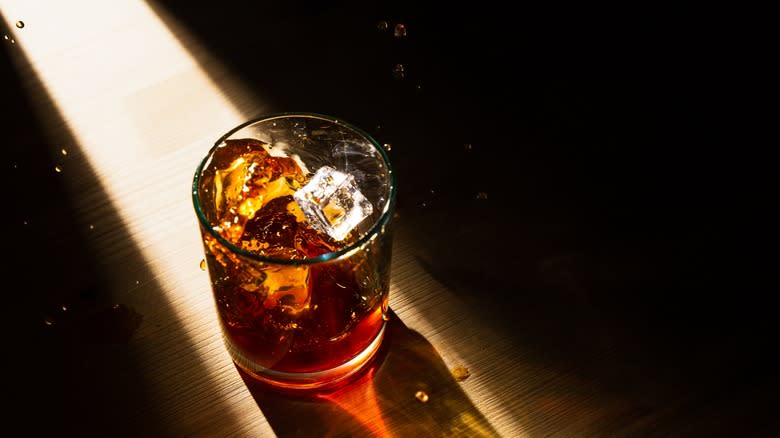Is Bourbon Considered Gluten-Free?

There's nothing quite so controversial in the world of nutrition as gluten. It wasn't so long ago that it seemed like everyone in the world had suddenly become gluten-intolerant. However you stand on the issue, celiac disease is a serious autoimmune disorder that requires people to avoid gluten entirely since there is no cure. For these people, a gluten-free diet is no fad but a medical necessity if they want to maintain their gut's health. If you are lucky enough to not have celiac disease, gluten is a naturally occurring protein found in grains like wheat and barley that poses no risk to your health — in fact, it's downright healthy.
But those who can't have gluten still want to sit down and have a drink with friends from time to time. Alcohol is an unusual genre of food in this case, and whiskey is particularly perplexing. Bourbon is a type of whiskey in which the mash bill must contain at least 51% corn, which is typically paired with rye and barley (though wheated bourbons will substitute rye with wheat). Corn is already gluten-free naturally, but rye, barley, and wheat all contain gluten.
So, if the ingredients contain gluten, then the final product contains gluten, right? Not so fast. Whiskey is almost universally considered gluten-free despite being made from glutinous grains thanks to the process of distillation. We say "almost universally" because there are some people who still warn celiacs to be cautious.
Read more: The 27 Best Bourbon Brands, Ranked
Bourbon Is Unambiguously Gluten-Free

To understand how this magic trick works, we need to talk about what distillation does. Distillation is the process whereby a liquid is purified through evaporation and condensation. Many modern distilleries use column stills for continuous distillation (which is distinct from triple-distillation), but we're going to focus on pot stills because they're easier to understand.
After the bourbon's mash has been fermented, it's placed in a big pot and heated up. As the liquid rises in temperature, the alcohol and water start to evaporate. This vapor rises up through a tube before being led into a second pot where the vapor is cooled down and condensed back into liquid form. This allows distillers to concentrate their product into a higher ABV.
The reason for this little science lesson is to show you why bourbon is gluten-free, and that's because gluten doesn't evaporate. When the distillation process is finished, all of the gluten will still be in the first pot. This is why you can distill saltwater into freshwater, since the salt similarly would not evaporate and transfer to the second pot. Although it's not as common in bourbon, there are whiskeys that are triple distilled, which means an even purer end product, but it only takes one distillation to remove the gluten. Depending on the severity of your gluten intolerance, you may want to exhibit caution anyway as some suggest since unintentional cross-contamination is theoretically possible, but cross-contamination is an entirely different issue.
Read the original article on Tasting Table

